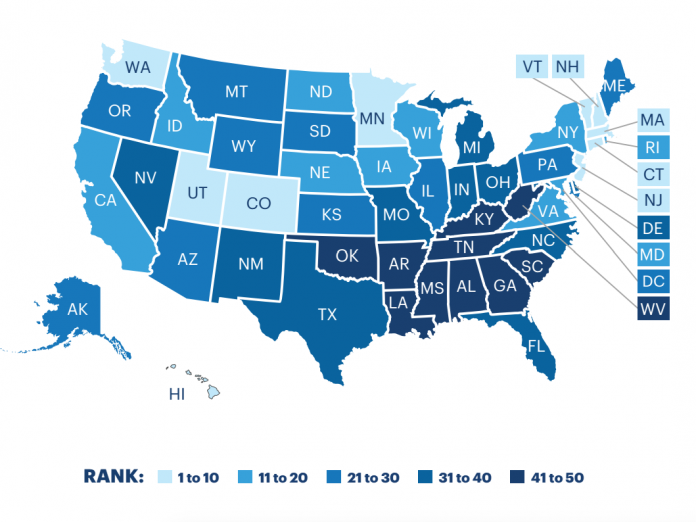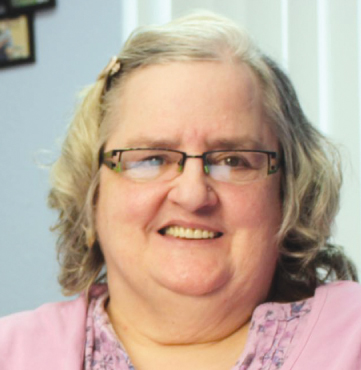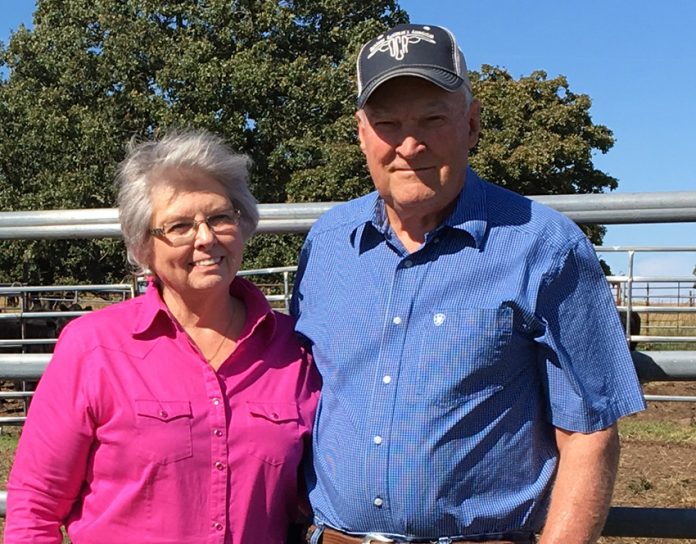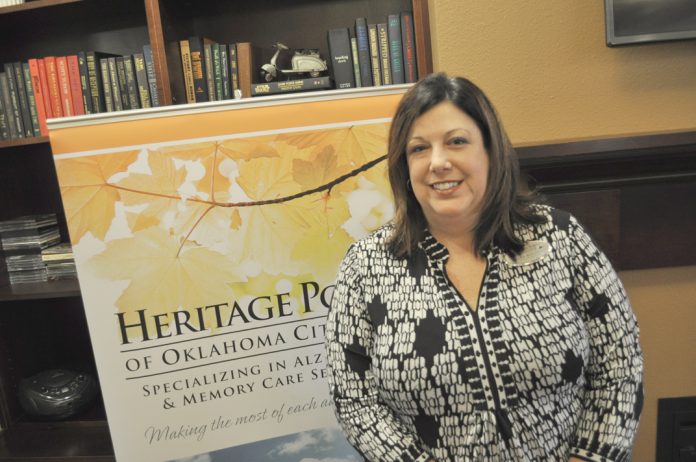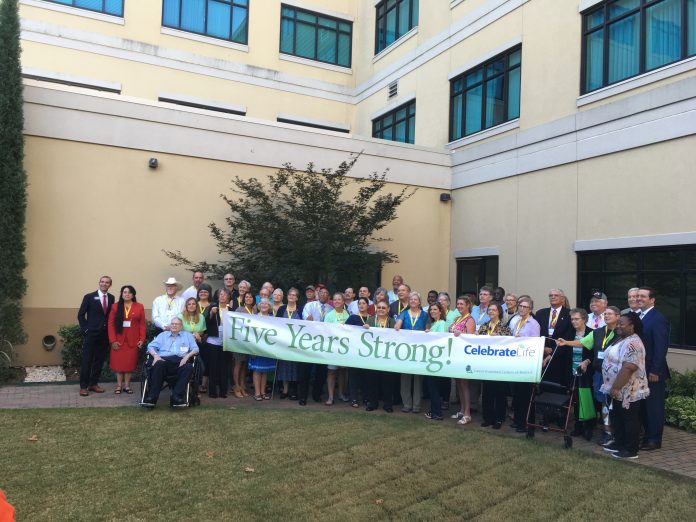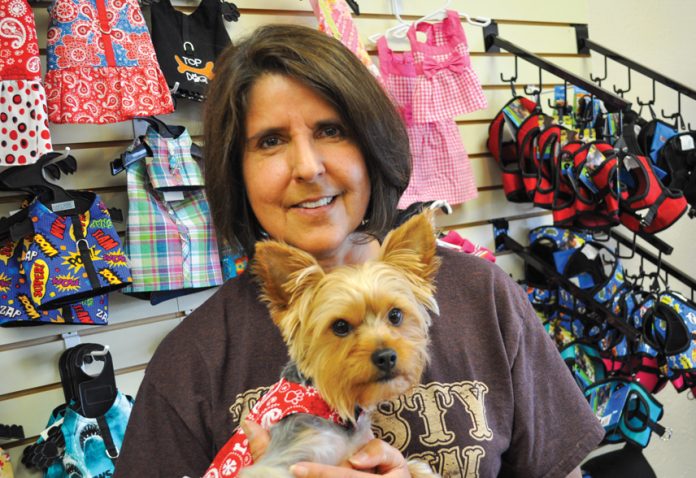Paced by the lowest smoking rate ever recorded, Oklahoma moved up three spots to 43rd in America’s Health Rankings, issued by the United Health Foundation. The improvement was the second highest among all states, trailing only Florida and Utah, which improved their ranking by four spots. America’s Health Rankings are based on four components or aspects of health – behaviors, community & environment, policy and clinical care. Health outcomes are also used to rank states.
“Despite the many challenges facing us, I am encouraged that our employees and our partners across the state continue to work toward improving the health of all Oklahomans and that their efforts are producing results,” said Interim OSDH Commissioner Preston Doerflinger. “We know where our focus must be in providing the core services that will make a difference in the lives of all our citizens going forward.”
In smoking rates, Oklahoma improved to 36th nationally – an improvement of nine spots. Oklahoma’s smoking rate has declined 25 percent in the past five years. That is the largest improvement for any state since 2012 but is still 2.5 percent higher than the national average of 17.1 percent.
An area in which Oklahoma is better than the national average, low birthweight, saw the state improve to 7.9 percent. Oklahoma has improved 11 spots to 22nd in the past five years, one of the best advances in the nation.
The best ratings for the state were in the low occurrence of excessive drinking (2nd), pertussis rates (2nd) and the number of mental health providers (5th). Oklahoma also had improvements in obesity rates, the number of people who are physically active, and drug deaths, but still ranks well below the national average.
Areas of concern include lack of health insurance, diabetes rates, and children’s immunization rates.
While Oklahoma’s uninsured rate has decreased the past three years to 13.9 percent, the national ranking dropped another two spots to 48th and the rate lags far behind the national rate of nine percent.
Following a national trend that saw an all-time high in diabetes rates of 10.5 percent nationally, Oklahoma is ranked 41st with a rate of 12 percent. The rate of immunization among children 19 to 35 months dropped significantly (75.4 percent to 67 percent) moving the state ranking to 42nd while overall adolescent immunization rates improved by six places (40th to 34th).
The complete rankings and summaries for Oklahoma and all states can be seen at https://www.americashealthrankings.org
Oklahoma Moves up Three Spots in America’s Health Rankings
Oklahoma Gardeners Association 3rd Annual Garden Boot Camp
“3rd Annual Garden Boot Camp presented by Oklahoma Gardeners Association will be held Saturdays, January 27, February 3, and February 10, 2018, 9:00 am – 3:30 pm, at Will Rogers Exhibition Center, 3400 NW 36th Street, OKC. Three Saturdays filled with a wide range of gardening information presented by horticultural specialist from around our State. Great to give as a gift to family and friends. Gift Certificates available now. $45 for all 3 Saturdays. For more information or to register, visit our website, www.okgardeners.org or call 694-8456. Seating limited. Deadline for registration is January 12, 2018”.
Oklahoma Gardeners Association is a 501c3 organization. Thier mission is to educate the public using sound research-based horticultural information. We offer children’ programs, informational tables at fairs, garden shows and other events, and speakers who make presentations at various organizational meetings and garden shows in addition to the annual Garden Boot Camp in January and February each year to give gardeners information to start their gardening season right.
Dec/Jan AARP Drivers Safety Classes
Date/ Day/ Location/ Time/ Registration #/ Instructor
Jan 4/ Thursday/ Okla. City/ 9 am – 3:30 pm/ 951-2277/ Varacchi
Integris 3rd Age Life Center – 5100 N. Brookline, Suite 100
Jan 8/ Monday/ Midwest City/ 9 am – 3:30 pm/ 473-9239/ Williams
First Christian Church – 11950 E. Reno Ave.
Jan 9/ Tuesday/ Yukon/ 9 am – 3:30 pm/ 350-7680/ Kruck
Dale Robertson Center – 1200 Lakeshore Dr.
Jan 9/ Tuesday/ Midwest City/ 9 am – 3:30 pm/ 691-4091/ Palinsky
Rose State Conventional Learning Center – 6191 Tinker Diagonal
Jan 10/ Wednesday/ Mustang/ 9 am – 3:30 pm/ 376-3411/ Kruck
Mustang Senior Center – 1201 N. Mustang Rd.
Jan 12/ Friday/ Okla. City/ 9 am – 3:30 pm/ 951-2277/ Edwards
S.W. Medical Center – 4200 S. Douglas, Suite B-10
Jan 23/ Tuesday/ Okla. City/ 9 am – 3:30 pm/ 773-6910/ Kruck
Healthy Living – 11501 N. Rockwell
Jan 24/ Wednesday/ Norman/ 9 am – 3:30 pm/ 515-8300/ Schaumburg Silver Elms Estate – 2100 36th Ave. N.W.
Jan 24/ Wednesday/ OKC/ 9 am – 3:30 pm/ 751-3600/ Palinsky Fountains of Cantebery (Town Center Rm – 1404 N.W. 122nd St.
Jan 29/ Monday/ Shawnee/ 9:30 am – 3:45 pm/ 818-2916/ Brase Shawnee Senior Center – 401 S. Bell St.
The prices for the classes are: $15 for AARP members and $20 for Non-AARP. Call John Palinsky, zone coordinator for the Oklahoma City area at 405-691-4091 or send mail to: johnpalinsky@sbcglobal.net
DARLENE FRANKLIN: NOW YOU SEE IT, NOW YOU DON’T
By Darlene Franklin
God’s love never fails. At all. We can’t climb over, dig under or detour around His love. It fills every crook of the known and the unknown. (Ephesians 3:19, Romans 8:39, NIV))God’s love never fails. At all. We can’t climb over, dig under or detour around His love. It fills every crook of the known and the unknown. (Ephesians 3:19, Romans 8:39, NIV))However, our experience with His care works more like a magic trick. Imagine a heaven-sized jug filled with milk-colored love:An empty cup sits next to thefull container of God’s love.God’s no-matter-what love showers creation nature with times, seasons, and beauty. His written word shouts it in glorious prose. We read about babies held in the arms of barren women, of David dancing before the ark on the way to Jerusalem. The Living Word, Jesus, spelled it out in flesh, demonstrating how we should love one another.I feel more like Helen Keller, who lived in a void absent of sight, sound, or speech. She said, “I cried because I had no shoes until I saw a man who had no feet.” I don’t recognize its abundance until I see someone in greater need. We refuse the provided cup but instead use a self-made cone, which fails.God protected the Israelites for forty years. He provided for every need, but they still didn’t believe in His faithfulness When a spring didn’t appear to quench their thirst, they begged for Moses’s help. He fashioned a drinking cup of his own design when he struck the rock with his staff. Because He didn’t speak to the rock as God had instructed, the Lord was greatly displeased. For reasons I confess I don’t completely understand, God denied him entrance into the promised land. My daughter had Borderline Personality Disorder (BPD). I described the experience as traveling through a black hole that ate my flesh and spat out dry bones. BPD couldn’t be healed, but a person with the illness could adapt, survive, and even thrive. Whether we suffer from some form of short-term mental illness, a disorder, or just the highs and lows of life, many people have experienced a dark place. We seek God, begging for His love, and instead it seems like He is hiding. (Isaiah 64:7)Push the magic another step in your imagination: Suppose both the cup and the jug appear empty.Like the milk in the magic trick, God’s love hasn’t disappeared. But sometimes it’s invisible to the human eye. Roman philosopher Seneca pointed out that every new beginning comes from other beginning’s end. Joseph understood that. He became Pharaoh’s second-in-command only after he had been both a slave and a prisoner. Only after I accept the fact that no amount of effort can make my sixty-year-old body do the work of a young adult does the murk that’s been hiding God’s glory wash away. God rubs His hands together. “I’ve been waiting for you to join Me. Let go and watch Me go to work.”Light-bulb inventor Thomas Edison is famous for saying he found 10,000 ways that didn’t work. Failure to see God’s love doesn’t mean it’s not there.Back to the full jug and empty cup.Milk is poured into the glass so that milk appears in both the jug and the cup.Ebenezer Scrooge’s cup was worse than empty. Generations have celebrated the transformation of the king of “bah humbug” to the man who vowed to honor Christmas in his heart.During my Bible college years, I wrote a term paper on God’s love. I had no idea how necessary the verses, theories and patterns I uncovered would be throughout my life.My cup has appeared empty many times. * Studied piano for twelve years before being told I wasn’t good enough. * Married for life-divorced after twelve years.* Trained for missionary service-kicked out of two churches.I thought I reached rock bottom when my son was taken from the home as a teenager. Instead, God’s love pulsed within that my frozen core and kept me going when I felt hopeless. Those years trained me for my daughter’s death. I felt numb, but not unloved. Love poured over me through the gifts of countless friends from around the world. When I couldn’t see God’s care in my drinking cup, He kept me alive and healed me.The promise is no illusion. God’s love is real, and it will never fail.Even if it took me 10,000 tries for me to see His brilliance.
Significant Women in Oklahoma Agriculture Highlight: Virginia Norris Rogers
story and photos by Betty Thompson
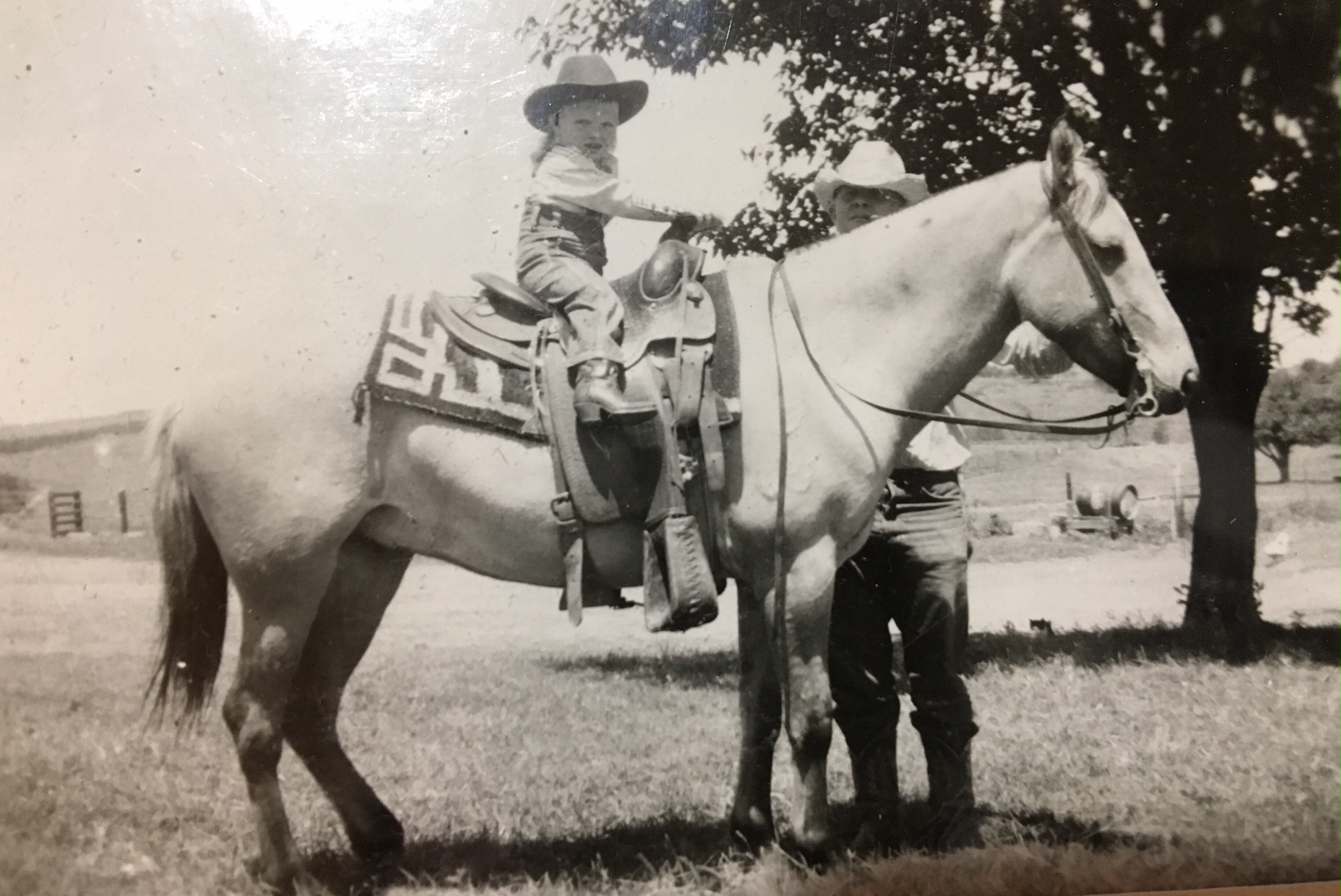
Pawnee – It has been said that a picture is worth a thousand words. The framed photo of young Virginia Norris Rogers sitting horseback, dressed in her boots, jeans, button up and cowboy hat, is no exception. The photo is a mere glimpse of the woman she would become, strongly rooted in agriculture.
“I tell people my outfit never changed, I just buy bigger sizes,” laughs Rogers.
Rogers said she began working on the ranch at a very young age with her father and their long-time ranch hand Albert. She even had a horse before she was born, which she later named “Chicken,” because of his yellow color.
“I was out at the crack of dawn getting cattle in,” Rogers recalled. “We would work until noon or so, and then my dad would go off to auction.”
Her father, Cecil “Whitey” Norris, started trading cattle at the age of 16 and became an auctioneer at age 23. Rogers said he went to an auction just about everyday.
After marrying Avis, Rogers’ mother, in 1933, Cecil bought 160 acres of land and used every opportunity from trading and auctions to buy more land. Together, they built a ranch of nearly 5,000 acres with horses and Hereford cattle.
Rogers is proud to be a fourth-generation farmer in Pawnee County and deeply rooted in agriculture. Family photos and keepsakes fill her walls and shelves, including her parents’ spurs, which hang above the front door. Her grandfather’s brand was the first brand ever registered in the state of Oklahoma and is still used today by her cousin John Henry.
“I think it’s [agriculture] been more fulfilling than shaping,” said Rogers. “It’s hard to describe what’s in your blood. You don’t know anything else.”
Rogers was no stranger to the hardships that ranch life brought: drought, cattle prices, finding reliable help, and more, but her love for ranching never faltered. After marrying her husband Olin, she said “it was just natural” for them to start their own ranching operation, Rogers Ranches, LLC, and have been running the operation ever since.
Rogers and Olin have been married for 42 years and have been running their commercial Angus herd on the farm Olin grew up on since 1986.
“It’s not a lot, but it’s enough to keep us busy,” laughed Rogers.
Busy is an understatement.
Not long after marrying, they bought an insurance agency which they worked while running their cattle operation, and only just sold it in November 2011.
Rogers was also very active in Oklahoma Extension Homemakers, now known as Oklahoma Home and Community Educators, a service designed to provide homemakers with resources similar to the resources farmers receive from the extension service. Rogers served as the county secretary/treasurer under Martha Waters, who was the first woman to be a director of an Oklahoma county extension.
A few years later, she was appointed to serve on the Pawnee County Health Department Board.
Like her father, Rogers and Olin have always been active in the Pawnee County Cattlemen’s Association (PCCA). Olin served as PCCA president in the early 1970s, and Rogers served as president from 2009 to 2011. During Rogers’ time as PCCA president, PCCA became a unified county under the Oklahoma Cattlemen’s Association (OCA). Rogers went on to serve for three years as a district director for the OCA before being elected as the North Central District vice president, putting her on the Executive Board of Directors. She also makes it a priority to be involved in the Oklahoma Cattlewomen’s Association as well.
“It has been very rewarding,” Rogers said. “I love it. Olin and I both enjoy meeting other people and learning about ranches across Oklahoma.”
Rogers was recently appointed to serve as the president of the Pawnee County Economic Development Foundation by the chairman of the Pawnee County Commissioners. The Foundation is actively involved in trying to bring new businesses to the community, and recently awarded a $75,000 grant to the city of Pawnee to refurbish an old building.
In addition to her leadership positions, Rogers writes a column for the local newspaper addressing concerns for farmers and ranchers.
“I just had this wild hair idea one day to start writing about issues in the cattle industry,” Rogers said. “Every now and then I throw in a column about my upbringing, experiences on the ranch as a child, or encourage membership and participation in the OCA.”
If you think she cannot make time for any other commitments, think again.
Rogers also serves as Chairman of the Board for her church, as well as staying busy with four grandchildren and two great-grandchildren.
She attributes this desire to give back to her upbringing.
“I learned early from my family that caring for people was important,” Rogers said. “You have to do what you can for others. I hope to relate to others that agriculture is vital to our state.”
Another important lesson she learned on the ranch is that you can be caring and giving, but also a tough fighter.
Rogers laughed recalling that she woke up to her father saying “Get up boys!” even though it was only her sister and her. Perhaps that oftentimes hard upbringing is what made her so strong when she was diagnosed four years ago with breast cancer.
However, cancer picked the wrong cowgirl. Today, she is cancer-free and proud to be called a survivor.
“I never had a ‘straight path’ in life,” Rogers said, “but I love doing what I am doing now—trying to be one of the best representatives for agriculture I can be.”
Get to the Point: Heritage Point offers person-centered care, 24/7
by Bobby Anderson, Staff Writer
With a lifetime in resident care Kara Bolino knows that no matter what, people always come first.
That’s why the Executive Director at Heritage Point of Oklahoma City is so proud her memory impairment community serves as a resource for families 24 hours a day, seven days a week, 365 days a year.
Most recently, Heritage Point has created a response team that allows for families to move residents in 24 hours a day if a crisis arises.
“We’re really good at making things happen if they need to,” Bolino said. “Any type of emergency situation we’re able to pull together and help families out. We have a nurse who is really flexible and more than willing to go and do an immediate assessment.”
“We can be here in the evening or at night for them. It’s important to be flexible. If we’re only here 9 to 5 how does that help anybody in a crisis?”
The ability to respond to patients’ changing needs – whether they be emergent or day-to-day – has always been the philosophy from President and Owner Kip Pammenter and Vice President of Operations David Thompson.
Pammenter created the original Heritage Point community in Overland Park, Kansas years ago, changing the way memory care was delivered and benchmarked.
PERSONAL APPROACH
Heritage Point was designed after that Overland Park community and is a sister residence to Heritage Point Tulsa.
When Pammenter talks about residents he uses their first names.
The president of a company that specializes in Alzheimer’s and memory care knows that’s the only way you can truly make a difference in someone’s life. Getting to know each and every client and meeting them where they are, is the hallmark of Pammenter’s successful approach to person-centered care.
Dealing with the effects of Alzheimer’s disease and trying to understand available care options can be extremely challenging for families. That’s why Pammenter designed Heritage Point to work with families to envision a better way to live with Alzheimer’s disease and other dementia related impairments.
Pammenter wants to truly reinvent Alzheimer’s care and what life should be like for seniors with cognitive challenges. The focus is on each individual resident; knowing who they are and what they love to do…and then finding activities that have meaning and purpose.
Heritage Point offers a smaller, home environment that promotes dignity, respect and love. A dedicated team of experienced and caring staff understands the importance of developing close personal relationships with residents and becomes an extended part of your family.
The philosophy is that everything starts with the idea that every individual is a whole person – regardless of their level of dementia – with many different backgrounds, abilities, interests, beliefs, preferences, and needs.
“Every day is different to be honest and I think that’s a good thing,” Bolino said. “All of our residents function different daily. Every day is something new. The residents dictate the day and that’s a big thing we focus on. We want everyone to be their own individual self and do what they normally do and us work around them.”
The belief at Heritage Point is that each resident deserves to be understood and should be encouraged to be involved, to whatever extent possible, in participating in their care.
There’s a value and respect for residents’ innate right to have choices everyday and strive to provide opportunities for life activities that not only have meaning and purpose, but also promote independence and choice.
To that end, each home has a homemaker that is dedicated to creating an atmosphere that encourages and inspires resident participation in dynamic activities program.
A key part of taking a person-centered approach to care is embracing an interactive process that focuses on building personal relationships between each resident, their family, medical professionals, and care staff.
The goal is to create a collaborative partnership among everyone involved that ultimately enhances each resident’s daily life experiences.
In each home, everything is guided first by the question, “What is the right thing to do for the resident?”
That begins with a comprehensive sit-down meeting with families and Heritage Point managers and caregivers.
From dietary to housekeeping to nursing each member sits down with families ready to ask and answer any and all questions to make sure residents feel at home.
“It’s critical,” Bolino said. “I think the families need to be able to come to you with whatever. Our entire management team sits down with families and tries to get to know residents on a personal level and their family so we can provide the care we’re talking about.”
“The Tree of Life” central to 22nd Annual “Celebrate Life” Event
by Mary Waller
In many cultures the tree is a symbol of life, of a fresh start, of good health or a bright future. For these reasons, the tree has become a central figure for Cancer Treatment Centers of America (CTCA) and its 22nd annual Celebrate Life event which honors cancer survivors for their personal triumphs over cancer, five years after first receiving treatment at the Tulsa hospital. To honor these survivors, the hospital plants a tree through the Arbor Day Foundation in their name.
This year, almost 50 cancer celebrants made the trip to Tulsa for event at CTCA in northeastern Oklahoma. The honorees journeyed from all over the country – from Colorado to Florida. Many brought friends with their relatives, surrounding themselves with the caregivers, prayer warriors, best friends, spouses, parents, children and grandchildren who had been with them each step of their treatment and recovery. During the uplifting event, CTCA nurses, doctors, administrators, staff, and of course family, cheered as each name was called and as white doves were released.
Reaching the five-year survival mark is a huge milestone for most patients who have experienced the cancer journey. And not just for the patients and family, but also for the hospital’s team members, especially the nurses. The special celebration is a time for many nurses to see patients once more for who they have cared, counseled, served and often come to know incredibly well.
“We are all always thrilled to share this special and uplifting day in our patients’ lives,” said Tammi Holden, chief nursing officer and vice president of oncology patient services at CTCA in Tulsa on behalf of the staff. “When a patient comes to our hospital, our entire team – from medical oncologists and registered nurses to physical therapists and licensed dietitians – works together with the individual and their caregivers toward the goal of not just surviving, but thriving.
“This event is an important tradition that commemorates their incredible story and every single new day they enjoy,” added Holden. And for every survivor, CTCA commits to planting a tree in their honor.
In addition to returning to Tulsa for the event, the Celebrate Life honorees are given the opportunity to add their names on brass leaves to the “Tree of Life” in the hospital’s entrance. In addition, an Interactive Survivor Tree, which includes a kiosk and large electronic wall screen near the lobby fireplace, allows visitors to select a specific person’s leaf and hear more about their cancer story. After participating in activities such as a group photo opportunity, “Camp Thrive Survivorship Fair,” and a luncheon, many survivors often seek out a beloved nurse, favorite doctor or special staff member for a hug or to introduce them to a family member.
This year CTCA celebrated 27 years in Tulsa serving, caring for, treating and helping patients. Over the years, the hospital has recognized more than 1,500 Celebrate Life five-year survivors and this year added a second “Tree of Life” in the hospital’s gallery to hold all of the honoree’s names.
Holden added, “The forest continues to grow, and that’s a good thing!”
A calling to care: a passion for hospitality
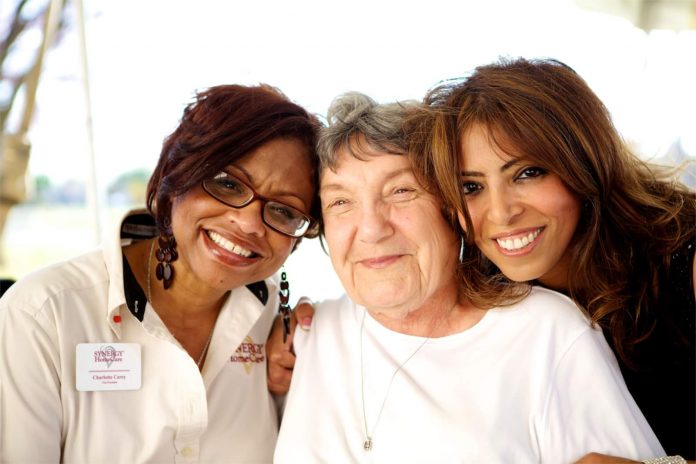
SYNERGY HomeCare provides hope and help to seniors and their families
by Traci Chapman
Kassem always knew she had a calling to serve – it was a calling that became a beacon of light for seniors and their families who needed help.
“Caring for people and providing hospitality are my natural passions, and part of my culture is to care for seniors,” Kassem said.
Kassem’s passion lit the beacon that became SYNERGY HomeCare, a flame that began to burn in 2011.
It was in 2011 Kassem graduated with an MBA from University of Central Oklahoma. That graduation marked a turning point for her – Kassem said she saw a void when it came to compassionate senior care and was determined to do something about it.
Kassem had a unique approach – fusing her drive to care for people with her love for hospitality, she did extensive research on senior care franchises. When she found SYNERGY, Kassem knew exactly where she was meant to be, she said.
“My heart just connected with the mission and values of SYNERGY HomeCare,” she said.
Kassem’s philosophy quickly took hold, spurring growth for the local franchise. Today, Kassem’s SYNERGY operation includes two offices – the original in Edmond and a second location, opened in December 2016 in Norman – employing 10 staff members and more than 100 caregivers. The company has a 5-mile service area and also provides referrals to clients in other locales, Kassem said.
“Although the metro area is geographically widespread, the small-town culture naturally evolved into relationships extending southward down the Interstae-35 corridor, allowing SYNERGY to begin penetrating the Moore/Norman market,” Kassem said.
While about five percent of Kassem’s caregivers provide live-in care, most do not, offering services to clients that take anywhere from an hour and up to 24 hours, at any given time, she said. Those caregivers tend to a myriad of needs, from the most personal – like bathing and dressing, feeding, dealing with incontinence and other issues – to companionship, coordinating outside appointments and services, meal planning and preparation, transportation, light housekeeping and running errands.
Those, of course, are necessities and things seniors need assistance with every day. But, there is so much more to it – and, that’s where post-hospitalization care comes in, Kassem said.
“It’s difficult for anyone to come home after a hospital stay, but for seniors it can be much more challenging – they might suffer from memory loss, their health depends on remembering and following hospital discharge instructions, keeping follow-up doctor’s appointments and other matters,” she said. “They also face trying to take care of day-to-day tasks while they’re recuperating.”
According to the Agency for Healthcare Research and Quality, almost a quarter of seniors hospitalized are readmitted within 30 days of discharge, many times for conditions unrelated to the initial illness or injury. That’s one reason why SYNERGY moves beyond daily assistance, with coworkers providing medical and emotional issue care, including care management, recovery assistance, difficult behavior management and more. Caregivers provide help, and hope, not only to senior clients, but may also provide relief for family members who need respite from taking care of a loved one, Kassem said. It’s assistance that can mean all the difference to everyone involved, she said.
All Kassem SYNERGY caregivers are employees, not contract labor – something somewhat unusual in the senior home care industry, and management is always a phone call away, including on-staff supervising registered nurses, she said. Care assessments are always provided on a complimentary basis, Kassem said.
Veterans are an integral part of SYNERGY’s mission – in fact, she said the organization is one of the largest veteran home care providers in the state.
“Veterans call us directly, and we can even help get them through the paperwork process,” Kassem said. “At times we work with the VA Center in Norman and with the Dale K. Graham Foundation in Norman.”
As SYNERGY continues to grow, Kassem said she hopes to provide even more services, including expanding a program started in 2017 – Dine & Discuss, an event hosted at SYNERGY’s Edmond location, which also served as an Alzheimer’s Association fundraiser.
“We partnered with the Alzheimer’s Association, where we provided complimentary dinner and two free hours of respite care while the topic was discussed,” she said. “The topics change each month, and the speaker also varies – we hope to create the same opportunity to the public going into 2018, but working towards creating a calendar of speakers further in advance and promoting it more so the word is spread.”
More information is available by calling or reviewing SYNERGY HomeCare’s websites, both for its Edmond and Norman locations:
SYNERGY HomeCare Edmond
13720 N Bryant Ave
Edmond, Oklahoma 73013
405-254-3046
www.synergyhomecareedmond.com
SYNERGY HomeCareNorman
1272 N Interstate Drive
Norman, Oklahoma 73072
405-701-0791
www.synergyhomecarenorman.com
VOLUNTEERS NEEDED
Make a Difference Volunteering for Resident’s in Long-Term Care
The Long-Term Care Ombudsman Program serves residents in nursing homes, assisted living centers and residential care homes. An Ombudsman helps to improve the quality of care and life for the residents living in long-term care communities. As a friendly visitor and advocate, the volunteer has many opportunities to be of service and enrich the lives of the residents. Many residents never have a visitor after moving to a long-term care facility.
If you are interested in making a difference in the lives of residents in Canadian, Cleveland, Logan or Oklahoma Counties, we have opportunities waiting for you. If you are willing to be that friendly face and advocacy helper, it only takes a desire to be the difference in someone’s life. Potential volunteers are required to complete a two-day training class, become designated to a facility, attend a once a month educational training meeting, and commit to a minimum of only 2 hours per week visiting with residents. Sound simple? It is! Such a small sacrifice to make a huge impact in the lives of so many. Our aging community deserves a happy life. Will you help deliver some happiness?
The next training will be January 24th & 25th, 2018 held at Areawide Aging Agency, located at 4101 Perimeter Center Drive, Suite 310, Oklahoma City, Oklahoma. There is no cost involved and refreshments will be served, but lunch is on your own. Each day classes begin at 9:00 a.m. and will adjourn at 3:00 p.m. This is a FREE 2-day training. If you are interested in becoming a volunteer, or just want to learn more about the Long-Term Care Ombudsman Program, please RSVP by January 17,2018. Please contact Ombudsman Supervisor Tonya VanScoyoc, (405)942-8500. Hurry!! There’s limited seating so register to attend in order to save your seat.
Cause for Paws- Retiree opens pet boutique
by Bobby Anderson, Staff Writer
Linda Ardray worked in health care for more than 30 years.
Approaching retirement after working as an MRI tech, Ardray wondered what she would do with the rest of her life.
She knew she had a lot of free time ahead of her. And she didn’t have any big plans to travel the globe.
Sitting at home all day didn’t seem too appealing either.
“My dad was an accountant and he always said you have to start your own business, that’s the only way you’re going to make it,” she said with a laugh.
So she took a deep long look at where her passions lied.
Turns out they were lying at her feet under the kitchen table.
“My dog is my kid and I wanted to get her really good food,” Ardray said of the beginning of her business plan. “I went online to see what I really needed to look for.”
She went to one of the big box stores for pets. Up and down the aisles she went, eventually leaving without what she was looking for.
“That’s why I thought we needed this in Moore,” she said. “I like that I’m right here and that I’m a little neighborhood store.
That’s how The Dusty Paw was born.
Just east of the Cleveland County Health Department’s Moore location, The Dusty Paw serves pet owners looking to make informed decisions about what they feed their animals.
“Unfortunately, the pet food industry is not very transparent,” she said. “There’s groups out there trying to change legislation on the wording of pet food. Instead of pet food a lot of it is pet feed.
“Once I started this store and really delved into it I thought ‘Oh, my God.’”
She noticed immediate changes from both her dog and her cat when she switched their food to one with purer ingredients.
A reduction in shedding was one of the first benefits.
Ardray has a miniature Australian Shepherd. Now 13, her dog still acts like a pup.
“She just runs circles in the backyard,” Ardray said. “When I changed her over I saw the biggest difference.”
Getting up every morning to go to work and then coming home at night, Ardray discovered that after 30 years she didn’t truly know the community she lived in.
Now, every day is an opportunity to bond with someone new.
“The customers are happy when they come in. The dogs are happy when they come in,” she said. “I’ve made a lot of friends here.”
She opened The Dusty Paw in February 2016, shifting from health care to entrepreneur.
“I had more time when I had a job,” she said, only half joking. “But it’s been fun. It’s been very rewarding.
And some things still remain the same. She’s still taking care of people on a daily basis.
Owning a business has allowed her to express her creative side. Often people come to The Dusty Paw in search of quality pet food but they fall in love with Ardray’s hand-made vests and leashes.
Pets are welcome to browse with their owners and most often leave with either a new treat, toy or article of clothing.
“I want them to know that they can come in here and if I can’t answer their questions about nutrition I’ll find out,” she said. “I have a nutritionist I can call for answers. I just want it to feel welcome here, not just a store.”
Ardray remains active in the community, raising funds for various causes, most of them animal related. In December she’s offering an opportunity for owners to bring their pets for photos with Santa. All proceeds benefit the Moore Animal Shelter.
She has a drop box for Pet Food Pantry, which currently serves over 8,000 lbs of dry food & over 2,500 cans of wet food each month to cats and dogs belonging to the homeless, elderly and veterans in Oklahoma.
The pantry also gets her expired food.
With Blake Shelton playing on the radio in the background, Ardray describes herself as a “wanna-be country girl.”
Her down-to-earth demeanor makes it easy for people to ask for advice. She’s researched the ins and outs of all things pet food related.
She warns customers to make sure they know where their food is sourced from.
“You can put Made in the USA on something and it can still be sourced from overseas,” she said.
You can be sure Ardray knows where everything in her store is coming from.
It’s now her passion in life.


